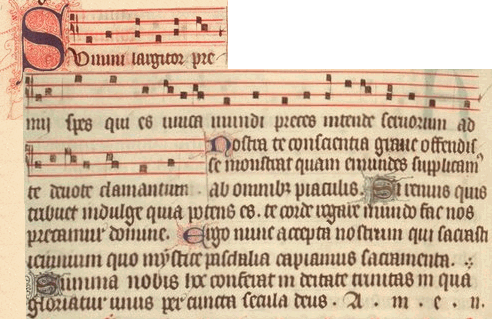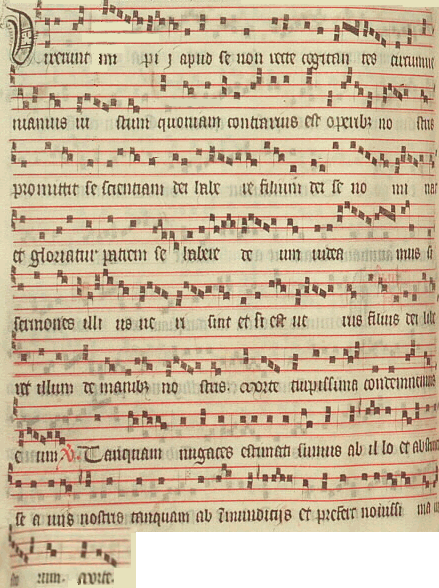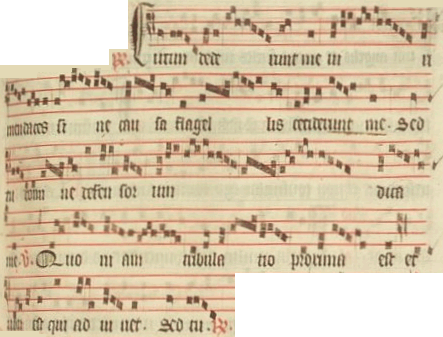READINGS: LENT FRIDAY IV

Invitatory Psalm & BACK

Psalm 78A and BACK
שׁוּבוּ אֶל־יְהוָה אֱלֹהֵיכֶם — כִּי־חַנּוּן וְרַחוּם הוּא
Even Years: Numbers 9:15—10:10,33-36 15 וּבְיוֹם
הָקִים
אֶת־הַמִּשְׁכָּן
כִּסָּה
הֶעָנָן
אֶת־הַמִּשְׁכָּן
לְאֹהֶל
הָעֵדֻת
וּבָעֶרֶב יִהְיֶה
עַל־הַמִּשְׁכָּן
כְּמַרְאֵה־אֵשׁ
עַד־בֹּקֶר׃
| 15 On the day the Dwelling was erected, the cloud covered the Dwelling, the Tent of the Testimony. From nightfall until morning it remained over the Dwelling looking like fire. 16 So the cloud covered it all the time, and at night it looked like fire. 17 Whenever the cloud rose from the Tent, the Israelites broke camp, and wherever the cloud halted, there the Israelites pitched camp. 18 At Yahweh's order, the Israelites set out and, at Yahweh's order, the Israelites pitched camp. They remained in camp for as long as the cloud rested on the Dwelling. 19 If the cloud stayed for many days on the Dwelling, the Israelites performed their duty to Yahweh and did not set out. 20 But if the cloud happened to stay for only a few days on the Dwelling, just as they had pitched camp at Yahweh's order, at Yahweh's order they set out. 21 If the cloud happened to remain only from evening to morning, they set out when it lifted the next morning. Or, if it stayed for a whole day and night, they set out only when it lifted. 22 Sometimes it stayed there for two days, a month, or a longer time; however long the cloud rested on the Dwelling, the Israelites remained in camp, and when it lifted they set out. 23 At Yahweh's order they pitched camp, and at Yahweh's order they set out. They performed their duty to Yahweh, as Yahweh had ordered through Moses. 10:1 Yahweh spoke to Moses and said: 2 Make yourself two trumpets; make them of beaten silver, so that you can use them for summoning the community, and for sounding the order to break camp. 3 Whenever they are sounded, the whole community must gather round you, at the entrance to the Tent of Meeting. 4 But if only one trumpet is sounded, then only the leaders, the heads of Israel's thousands, must gather round you. 5 When the trumpet blast is accompanied by a battle cry, the encampments pitched to the east will set out. 6 At the second blast accompanied by a battle cry, the encampments pitched to the south will set out. For breaking camp, the trumpet blast will be accompanied by a battle cry, 7 but for assembling the community the trumpets will be sounded without battle cry. 8 The Aaronite priests will sound the trumpets; this is a perpetual decree for you and your descendants. 9 When in your country you go to war against an enemy who is oppressing you, you will sound trumpets with a battle cry, and Yahweh your God will remember you, and you will be delivered from your enemies. 10 At your festivals, solemnities and new-moon feasts, you will sound the trumpets over your burnt offerings and communion sacrifices, so that they recall you to the remembrance of your God. I am Yahweh your God. 33 They set out from Yahweh's mountain and travelled for three days, while the ark of the covenant of Yahweh preceded them on the three-day journey, searching out a place for them to halt. 34 In the daytime, Yahweh's cloud was over them, once they had broken camp. 35 Whenever the ark set out, Moses would say: Rise, Yahweh, may your enemies be scattered and those who hate you flee at your approach! 36 And when it halted, he would say: Come back, Yahweh, to the countless thousands of Israel! | ||
Odd Years: Hebrews 10:1-18 σκιὰν
γὰρ ἔχων ὁ
νόμος τῶν
μελλόντων ἀγαθῶν,
Hebrews 10:1-18 1 So, since the Law contains no more than a reflection of the good things which were still to come, and no true image of them, it is quite incapable of bringing the worshippers to perfection, by means of the same sacrifices repeatedly offered year after year. 2 Otherwise, surely the offering of them would have stopped, because the worshippers, when they had been purified once, would have no awareness of sins. 3 But in fact the sins are recalled year after year in the sacrifices. 4 Bulls' blood and goats' blood are incapable of taking away sins, 5 and that is why he said, on coming into the world: You wanted no sacrifice or cereal offering, but you gave me a body. 6 You took no pleasure in burnt offering or sacrifice for sin; 7 then I said, 'Here I am, I am coming,' in the scroll of the book it is written of me, to do your will, God. 8 He says first You did not want what the Law lays down as the things to be offered, that is: the sacrifices, the cereal offerings, the burnt offerings and the sacrifices for sin, and you took no pleasure in them; 9 and then he says: Here I am! I am coming to do your will. He is abolishing the first sort to establish the second. 10 And this will was for us to be made holy by the offering of the body of Jesus Christ made once and for all. 11 Every priest stands at his duties every day, offering over and over again the same sacrifices which are quite incapable of taking away sins. 12 He, on the other hand, has offered one single sacrifice for sins, and then taken his seat for ever, at the right hand of God, 13 where he is now waiting till his enemies are made his footstool. 14 By virtue of that one single offering, he has achieved the eternal perfection of all who are sanctified. 15 The Holy Spirit attests this to us, for after saying: 16 No, this is the covenant I will make with them, when those days have come. the Lord says: In their minds I will plant my Laws writing them on their hearts, 17 and I shall never more call their sins to mind, or their offences. 18 When these have been forgiven, there can be no more sin offerings.
| | ||
Even Years: Cyril of Alexandria, Worship in spirit and truth, Book 5 (PG 68, 394-395)
Odd Years: Ambrose of Milan, Letter 12 extra collectionem, 47-50
|
| Prayer |

